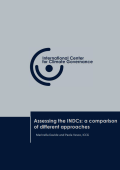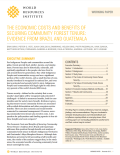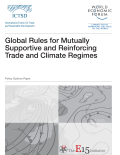
The “Intended nationally determined contributions” (INDCs) communicated by both developing and developed countries represent a crucial element of the Paris agreement. This brief aims at analysing the INDCs submitted by Parties, through the different tools and approaches proposed by the research community. In particular, our analysis looks at the different ways to assess the effectiveness of the proposed emission reduction pledges, both in terms of aggregate and national efforts. However, we also consider other factors that will be critical in determining the success of the Paris talks, such as the coherence and fairness of single contributions.

Evidence is growing that tenure-secure community forests are associated with avoided deforestation and other ecosystem-service benefits. However, securing community forest tenure also involves costs, including costs to establish supportive legislation, to demarcate and register the lands, to monitor and protect the lands as well as opportunity costs. But what are the costs compared to the benefits of securing and maintaining community forest tenure for community forest areas?
This working paper adresses this question by undertaking a benefit-cost analyses of community forest tenure in Brazil’s Indigenous Territories and Guatemala’s Maya Biosphere Reserve. Although data limitations prevented a full accounting of all costs and benefits, the results of the analyses suggest that:
- in the study areas, the economic benefits of securing community forest tenure outweigh the costs;
- securing community forest tenure is a low-cost, high-benefit investment that benefits communities, countries, and global society;
- investing in strong community forest tenure security can be a cost-effective measure for climate-change mitigation.

As the world intensifies its search for global solutions for climate change, far too little attention has been paid in global policy-making to the nexus between climate change and international trade. In particular, important opportunities for the trade system to contribute to addressing climate change have been overlooked. The overriding message addressed to both trade negotiators and climate negotiators in the present paper is that they must begin by acknowledging the inseparability of the two issues with the aim of framing global rules on trade and on climate that are mutually consistent, supportive, and reinforcing.
A multitude of initiatives, networks and organisations have adopted the concept of ‘green growth’ in recent years, in particular following the 2012 Rio+20 Conference on Sustainable Development. New and innovative concepts and approaches to green growth have been designed and tested in the field. In this context, the Donor Committee for Enterprise Development (DCED), through its Green Growth Working Group (GGWG) decided to contract an external organisation to take stock of different members’ environmentally sound and climate friendly private sector development initiatives over the past three years. The objective of this stocktaking report is to provide insight into the main trends related to green private sector development, identify different approaches to green growth in PSD initiatives, and point out emerging lessons.
In South-East Asia a number of stakeholders are seeking to leverage green growth strategies, to reach macroeconomic and societal goals, and engage in profitable business. Through experience however, many actors have encountered numerous obstacles and challenges in financing projects, executing transactions and facilitating climate finance flows.
Focusing on financial policy and regulatory developments in Indonesia, Vietnam, the Philippines, Cambodia and Malaysia, this reports explores the different barriers that exist to private climate finance flows in the region. It concludes that capital is hindered from moving towards low-carbon infrastructure because of a number of policy and regulatory barriers, including a lack of policy consistency and alignment, potential liquidity issues in the banking sector, and structural barriers to climate finance innovation in financial markets.
